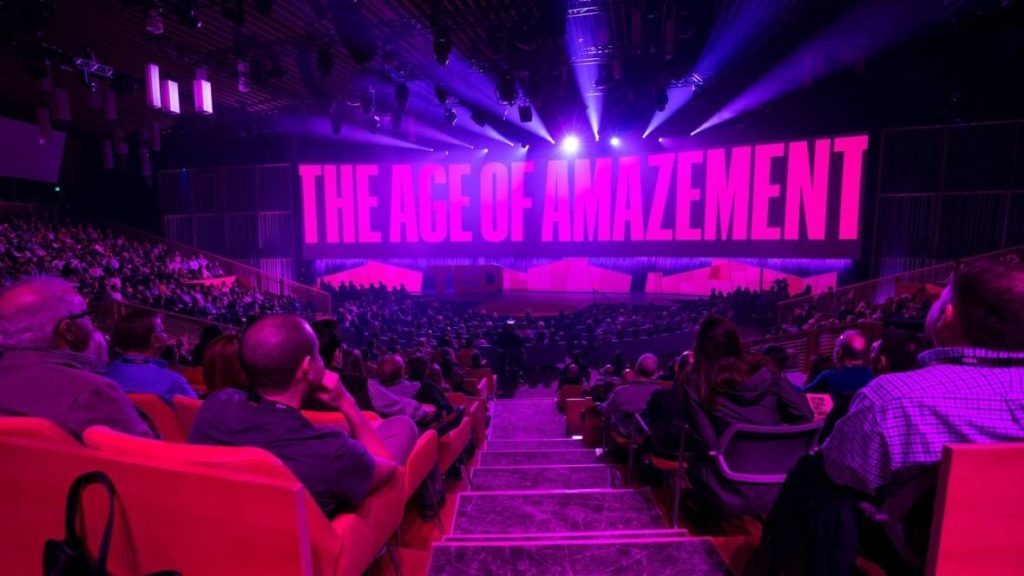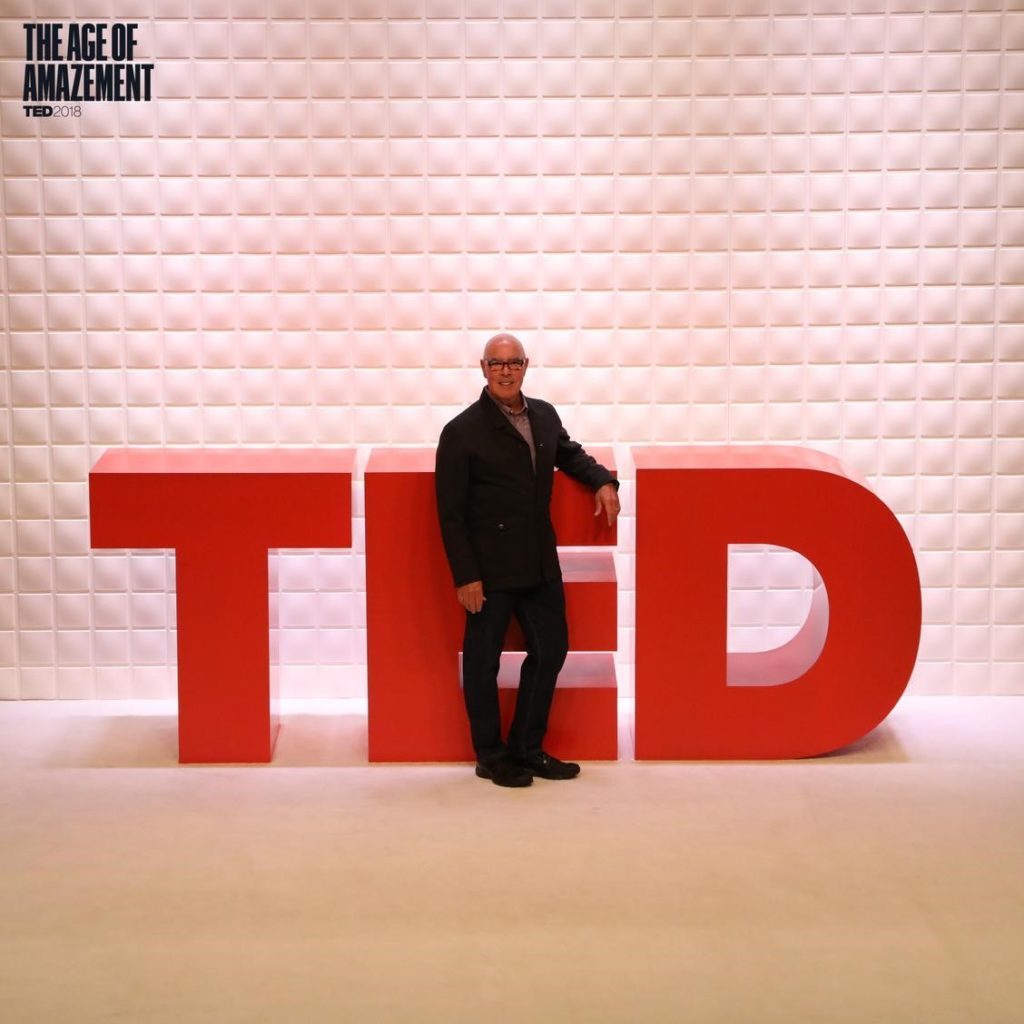I spent last week at the TED2018 conference in Vancouver, BC with 1199 other adventurous seekers. You’ll see the results of our celebration in Ted Talks online over the next twelve months or so. Traveling back to the east coast, I was reflecting on the week.
My thoughts are imperfect and incomplete, so to help describe it a bit, I offer you this little paraphrase from Terry Tempest Williams:
“Perhaps it is not so much what we learn that matters in these moments of awe and wonder, but what we feel in relationship to a world beyond ourselves, even beyond our own species.”
One is almost always quickened, made more thoughtful, by our nearness to great ideas, great events, great natural objects, great people—and TED2018 was no exception.

I was asked by the TED organization to host what they term a “Jeffersonian dinner,” a casual dinner party with some brain food for about twenty of the participants who signed up for a theme I chose which was (you guessed it) Are You Driven by the Past or Called to the Future? The group ranged in age from twenty-somethings to eighty-somethings, an astonishingly accomplished and diverse mix of artists, Antarctic explorers, entrepreneurs, teachers, PhD policy analysts, those moving to a new chapter…interesting each and every one. Here are a couple of my notes.
It seems to me the strangling hold of the mass pop culture, coupled with the civic commotion on us at this moment in time inspires, or even requires us to zoom out, take the high-altitude view, in order to help us to thrive, flourish—or even survive—in a world we were not biologically evolved for. Homo Sapiens were designed and spent 99+% of all human history as hunter-gatherers, and yet now we find ourselves…stuck in traffic. What?

The Big Idea of traditional psychology—the basic rock bottom premise of psychology since it began 150 years ago—is that we sapiens are driven by our past, that we cannot escape it. Traditional care givers believed that treating patients was a matter of unearthing and confronting the past—especially childhood traumas. Freud, for example, explained individual behavior as a complex psychodynamic of competing and largely unconscious drives. Inexplicable, dysfunctional, or accidental behavior is caused by unresolved past conflicts, he believed, mostly originating in childhood, playing themselves out below the level of awareness, driving our behavior. For most of the past, most care givers have assumed we are prisoners of the past.
Our TED dinner group quickly agreed the past certainly influences who we are; the question is whether it is deterministic. One friend pointed out after 150 years of scholarship in the social sciences, we are still unable to predict what you are going to do tomorrow by asking what you did yesterday.
Positive Psychology (a separate field from traditional psychology) on the other hand, is the scientific study of human flourishing, and an applied approach to optimal performance, optimal experience. It studies strengths and virtues that enable individuals, communities, and organizations to thrive and achieve their optimal potential. Can positive psychology tune you up, make you more human?
The Founder of positive psychology, Marty Seligman (whose current work inspired my theme), proposes that “prospection” is an alternate framework where people draw on experience to update a branching array of prospects that fan out in front of them. In this future-oriented thought process, the past is not a force that is deterministic or even drives them, but instead is a resource from which they selectively extract information about the prospects they face. These prospects include not only possibilities that have occurred before, but also possibilities that have never occurred before—and new potential possibilities that often play a decisive role in the selection of behavior or action.
Questions originally posed by Seligman that our dinner group vigorously debated:
We call ourselves Homo Sapiens—wise man—but is that accurate, or aspirational?
What if vision is not registration of the present, but a dream of the future?
What if memory is not a file drawer of photographs, but a hope chest of possibilities?
What if emotion is not agitation from the now, but guidance unlocking the potential of the future?
What if the mind is not a storehouse of knowledge, but an engine of prediction?
What if “knowing” a person is not about the last crossroad they faced, but what they will do at the next one?
What if action is not driven by the past, but pulled to the future?
What if we are not Homo Sapiens?
But Homo Prospectus?
The TED2018 Jeffersonian dinner group told colorful stories, candidly described their very personal life scar tissue, asked penetrating questions of one another, encouraged and supported personal vulnerability… ultimately evoked and demonstrated strong emotions. Ultimately, they argued persuasively that their combined experience and wisdom (a dazzling amount) informed them that the answer to the question “driven by the past or called to the future” was not (Freud and Seligman aside) a matter of on-off biology, but rather a matter of intention, attention, focus—where we direct our precious consciousness. It’s a choice. If to the past, then we can be driven by that. If to the future, well, we can feel “called.” So, our environment reflects conditions corresponding to the predominant mental attitude we give energy to.
Attention has been held to be the distinguishing mark of genius. The cultivation of attention depends upon practice, and one of the accomplishments of great thinkers is to focus on a few really big thoughts (since the mind has no more difficulty in handling large ideas than small ones).
The real battle in life is one of ideas, the dinner group thought. It is fought by the few against the many. On one side is positive, constructive, creative, caring thought. On the other is critical, destructive, negative, commodity-like thought. We are today the result of our past thinking, and we shall be in the future what we are thinking today.
In life, our TED2018 dinner group concluded, you get what you focus on.

Of Note: References and Further Reading:
Deutsch, David (2017). The Beginnings of Infinity: Explanations that Transform the World. London, Penguin Books.
Ericsson, Anders (2017). Peak: Secrets from the Science of Expertise. Boston, Houghton Mifflin Harcourt.
Haanel, Charles (1916). The Master Key System. Psychology Publishing.
Pinker, Steven (2018). Enlightenment NOW: The Case for Reason, Science, Humanism, and Progress. New York, Viking: Penguin Random House LLC.
Seligman, Martin, E.P., Railton, Peter, Baumeister, Roy F., & Sripada, Chandra (2017). Homo Prospectus. New York, Oxford University Press.
Taleb, Nassim Nicholas (2018). Skin in the Game: Hidden Asymmetries in Daily Life. New York, Penguin Random House LLC.
Produced and edited by Mari Lister.
© 2024 Bigelow LLC. All rights reserved.

